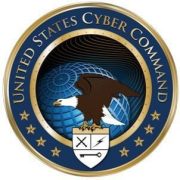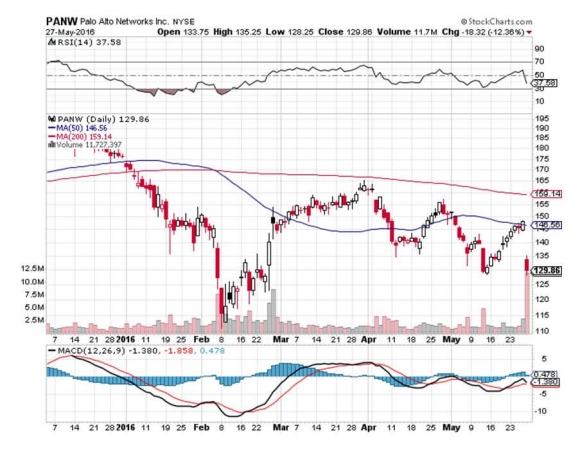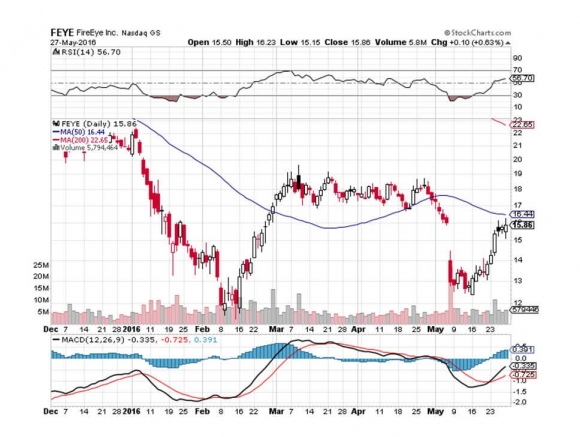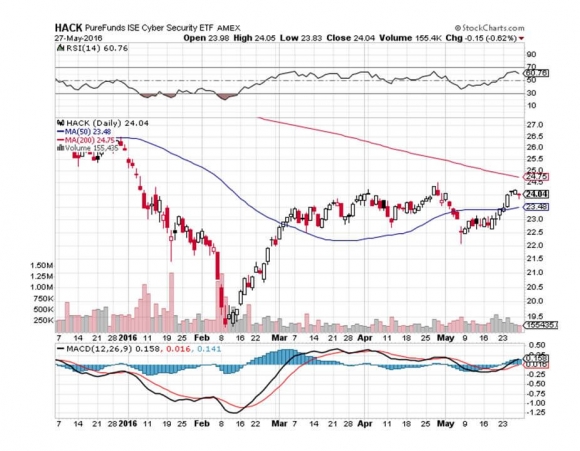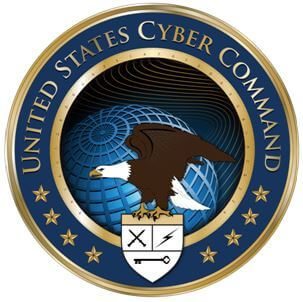The Ten Baggers in Cyber Security
The threat to America?s national security does not come from ISIS, Iran, Russia, or China. It is an online hack attack.
That is the view of General Keith B. Alexander, who recently retired as the head of US Cyber Command after a lifetime in the intelligence business, the country?s principal online warrior.
I discovered a long time ago that a retired general can be one of the most valuable sources of information about long term capital market trends. After a career spent exercising discretion and keeping opinions to themselves, the dam breaks.
Sometimes, I am amazed at what I can pick up. Of course, it helps that my own top-secret clearance is still valid.
So when the chance arose to secretly meet Alexander at an undisclosed location, I jumped at it.
The general argues that the US is the preeminent online target because we have so much to lose. A concentrated attack could simultaneously cripple all communications, power supply, and financial markets. Life, as we know it, would completely grind to a halt.
The greatest cyber attacks are yet to come.
The US has no shortage of enemies on this front. Vladimir Putin is attempting to reassemble the old Soviet Union. Iran is engaged in numerous adventures throughout the Middle East. China is expanding its empire at every opportunity.
Alexander knows what he is talking about.
He is a recently retired four-star general who served as Director of the National Security Agency (DIRNSA), Chief of the Central Security Service (CHCSS) and Commander of the United States Cyber Command.
He graduated from West Point, Class of 1974, along with three other future four-star generals, including former CIA chief, David Petraeus, and former Chairman of the Joint Chiefs of Staff, Martin Dempsey, whom I both know and have written about.
While head of Army Intelligence, he was in charge of 10,700 spies and eavesdroppers worldwide. He has three master?s degrees in business, physics, and systems technology.
A lightweight, he is not.
Alexander expressed his concern that ISIS was using Facebook (FB) to build a global terrorist network. Google (GOOG) has lost $10 billion in revenues to cyber attacks.
The government?s controversial collection of meta-data, now at risk from the republican controlled congress, was instrumental in preventing a plot to blow up the New York subway system in 2009.
Coordination between federal agencies is still a major problem. When the NSA discovered that CIA computers may have been compromised, they asked to take a look. They were refused.
Finally, pressure from the president opened the doors. The NSA discovered 1,500 Russian malware programs on agency mainframes and they scrubbed them in only 22 hours.
Big data programs on US computers in Iraq were instrumental in identifying, locating, and destroying much of the leadership of Al Qaida.
Ironically, the US military has broken up more hack attacks against European targets than US ones, thanks to their weaker defenses.
And here is the part that always blows my mind. Military men are often clueless about the market implications of their own far reaching conclusions.
That is where I step in.
It looks like the cyber security sector, one of the best market performers during the first half of? 2015, is about to take off like a rocket once again. There could be another 20-30% in it this year.
We are only one hack attack away from another blockbuster rally.
The near destruction of Sony (SNE) by North Korean hackers in 2014 has certainly put the fear of God into corporate America. Apparently, they have no sense of humor whatsoever north of the 38th parallel.
As a result, there is a generational upgrade in cyber security underway, with many potential targets boosting spending by multiples.
Alexander suggested that the world will probably never again see large-scale armies fielded by major industrial nations. Wars of the future will be fought online, as they have been silently and invisibly over the past 15 years.
All of those trillions of dollars spent on big ticket, heavy metal weapons systems are pure pork designed by politicians to buy voters in marginal swing states.
The money would be far better spent where it is most needed, on the cyber warfare front. Alexander is not alone in these views among America?s senior military leadership.
The problem is that when wars become cheaper, you fight more of them, as is the case with online combat.
You probably don?t know this, but during the Bush administration, the Chinese military downloaded the entire contents of the Pentagon?s mainframe computers at least seven times.
This was a neat trick because these computers were in stand alone, siloed, electromagnetically shielded facilities not connected to the Internet in any way.
In the process, they obtained the designs of all of our most advanced weapons systems, including our best nukes. What have they done with this top-secret information?
Absolutely nothing.
Like many in senior levels of the US military, the Chinese have concluded that these weapons are a useless waste of valuable resources. Far better value-for-money are more hackers, coders, and servers, which the Chinese have pursued with a vengeance.
You have seen this in the substantial tightening up of the Chinese Internet through the deployment of the Great Firewall, which blocks local access to most foreign websites.
Try sending an email to someone in the middle Kingdom with a Gmail address. It is almost impossible. This is why Google (GOOG) closed their offices there years ago.
As a member of the Joint Chiefs of Staff recently told me, ?The greatest threat to national defense is wasting money on national defense.?
Our nation?s military is clamoring for more money to take the cyber war to the enemy. Instead, they are effectively being given more horses, cavalry sabers, and cannon to fight it. No wonder they are eternally frustrated.
The implication is that I need to go out and buy Palo Alto Networks (PANW) once again, a company that I have been recommending since I started covering the industry a year ago. Since then, the shares have skyrocketed some 162%
Palo Alto Networks, Inc. is an American network security company based in Santa Clara, California just across the water from my Bay Area office.
The company?s core products are advanced firewalls designed to provide network security, visibility and granular control of network activity based on application, user, and content identification.
Palo Alto Networks competes in the unified threat management and network security industry against Cisco (CSCO), FireEye (FEYE), Fortinet (FTNT), Check Point (CHKP), Juniper Networks (JNPR), and Cyberoam, among others.
The really interesting thing about this industry is that there are no losers. That?s because companies are taking a layered approach to cyber security, parceling out contracts to many of the leading firms at once?looking to hedge their bets.
To say that top management has no idea what these products really do would be a huge understatement. Therefore, they buy all of them.
This makes a basket approach to the industry more feasible than usual. You can do this through buying the $435 million capitalized PureFunds ISE Cyber Security ETF (HACK), which boasts Cyberark Software (CYBR), Infoblox (BLOX), and FireEye (FEYE) as its three largest positions. (HACK) has been a hedge fund favorite since the Sony attack.
For more information about (HACK), please click here: http://www.pureetfs.com/etfs/hack.html.
If you ar
e looking for value plays in this area, you can forget about it. Neither (PANW) nor (FEYE) generate any net earnings. Much as with Tesla (TSLA), you are not betting on what the earnings are today, but what they might be worth in a decade, when the market is infinitely larger.
Think of them as faith based investments.
Could the shares today?s crop of cyber security companies rise tenfold from here? Absolutely! Actually, ten might be a low number. If nothing else, the entire industry has become prime takeover bait, offering potential instant profits.
Oh, and by the way, Alexander thinks that drone surveillance of US citizens is coming in the near future. Look out above!

